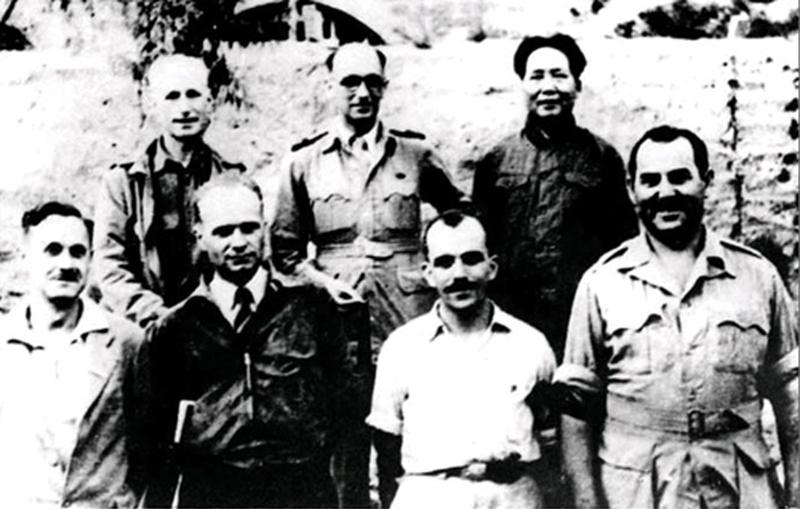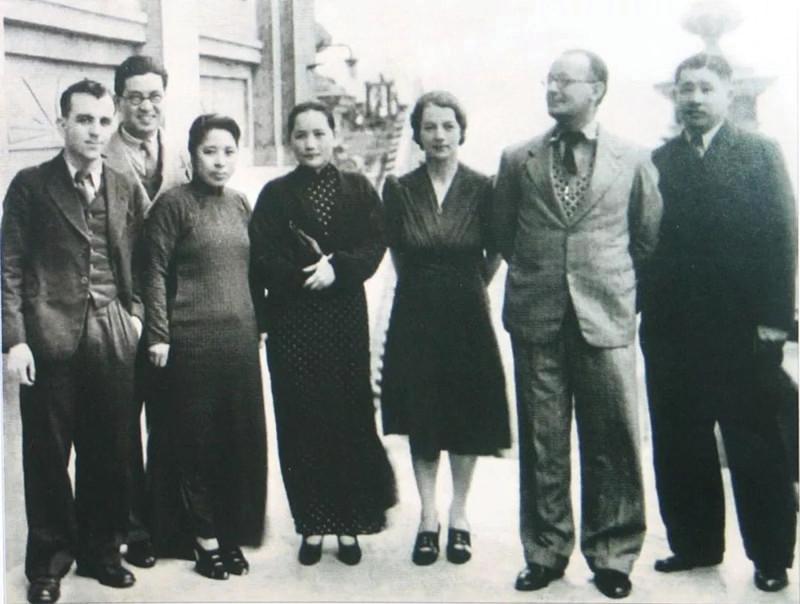 Israel Epstein, at the invitation of Soong Ching Ling, returned to China in 1951 to help establish China Reconstructs, later renamed China Today. (PHOTO PROVIDED TO CHINA DAILY)
Israel Epstein, at the invitation of Soong Ching Ling, returned to China in 1951 to help establish China Reconstructs, later renamed China Today. (PHOTO PROVIDED TO CHINA DAILY)
All seemed fresh and inspiring in Yan’an, the symbol of Chinese revolution, when young Polish-born reporter Israel Epstein set foot in the city in May 1944.
He recalled that it felt like entering a brand new world. “Instead of running away from the soldiers ... as those elsewhere in China often did, they (the peasants) ... brought out hot water for the troops to drink and, unasked, took care of the horses ... In general, the people behaved as though a member of their own household was on a long journey ...”
Epstein believed he shared a similar — or even the same — world outlook with the Communist Party of China, and was convinced that Yan’an represented China’s future.
Despite facing a tight blockade from the Nationalists, or Kuomintang, Epstein, thanks to some help provided by senior CPC official Zhou Enlai, was able to enter Yan’an as a correspondent along with a delegation of foreign journalists.
On their way to Yan’an, Epstein was amazed to find that soldiers and villagers in the border region had launched a “great production movement” to turn the desolate mountains and barren land of northern Shaanxi into fertile cropland.
As the delegation passed by golden fields of wheat and lush fields of bean and cotton, they were even more impressed at the sight of the officers and soldiers of the Eighth Route Army in the southeast of Yan’an working with enthusiasm in the farmland, wielding hoes and shovels while singing work songs.
In a report sharing his first experience in China’s anti-Japanese revolutionary base, Epstein wrote that northern Shaanxi had turned into a place of intensive farming, with plenty of livestock, a flourishing handicraft industry, and civilians enjoying a life of abundance.
In a letter to his wife, Epstein depicted the area as a “great nation on a small scale”.
He wrote that the locals “are amply sure that they are China, China’s future. Not that they say it. But it is apparent in every confident word and action, and smile. I became ever more convinced then that Yan’an was the shape of things to come in China, and the next decade would prove it.”
Over a period of three months in Yan’an, Epstein had many face-to-face interviews with leading CPC figures, including Mao Zedong, Zhu De and Zhou Enlai. He said he was impressed by Mao’s “ability to express complex strategic ideas in simple, unforgettable words which could engrave their meaning and logic even on the illiterate”.
Though living in a cave dwelling in Yan’an, Mao was a great man of the century and knew a lot about the outside world, Epstein said.
As for Zhu, Epstein described him as an amiable man who did not look anything like a battle-seasoned general, while Zhou, he observed, treated everyone as equal and cared little about himself.
 Clockwise from top right: Chairman Mao Zedong with foreign journalists Harrison Forman, Epstein, N.E. Proshenko, Maurice Votaw, Cormac Shananhan and Gunther Stein in Zaoyuan, Yan’an, in 1944. (PHOTO PROVIDED TO CHINA DAILY)
Clockwise from top right: Chairman Mao Zedong with foreign journalists Harrison Forman, Epstein, N.E. Proshenko, Maurice Votaw, Cormac Shananhan and Gunther Stein in Zaoyuan, Yan’an, in 1944. (PHOTO PROVIDED TO CHINA DAILY)
During his stay in Yan’an, Epstein sent numerous reports that enabled the world to know more about Yan’an and the CPC leaders. In a newsletter to The New York Times, he wrote that the Eighth Route Army kept a close bond with the people and never took a dime from them.
Many years later, he said the tour to Yan’an was an important visit that inspired him to go on the revolutionary path for the rest of his life.
“I see a completely different China which is totally different from the China under the rule of Kuomintang of Chiang Kai-shek. This China is full of hope and free from starvation and defeatist sentiment,” he said.
Epstein cherished an autographed portrait of Mao that the leader gave him in Yan’an, taking it along with him wherever he went and putting it up on a wall. He also took part in translating the works of Mao.
Born into a Jewish family in Warsaw, Poland, in 1915, Epstein moved to China with his parents at the age of two. He later described his boyhood in Tianjin: Amid the country’s “internecine wars and famines, I saw gaunt, ragged refugees flooding into Tianjin. Some begging tearfully for food, some offering to sell their children ...” he recalled.
Epstein could never forget one winter morning when he came upon a boy, who appeared to be around 12, crouched stiff in a doorway to seek shelter during the freezing night. A closer look revealed, to Epstein’s horror, that the boy was dead.
At the age of 15, Epstein started to work for Peking and Tientsin times, a local English-language newspaper. The young Epstein was struck by how poor and weak China was and how much suffering the Chinese people had to endure. He began to ponder, who on earth could save China? And what should he have as the purpose of his life?
In the 1930s, Epstein befriended the American journalist Edgar snow, who later showed him the great work Red Star Over China prior to its publication. He was greatly inspired by the spirit of the Red Army in Yan’an depicted in the book.
Together, Epstein and Snow once helped transport CPC member Deng Yingchao back to safety in Yan’an during the Japanse invasion, ferrying her under a false identity as “Madam Li Zhifan”. In 1937, under the CPC’s leadership, Epstein shielded her in a hotel in Tianjin. Epstein’s father helped Deng buy a treasured travel ticket at that time. The older man said the family believed in Marxism, which influenced his son’s outlook on life.
After the Lugou Bridge Incident in Beijing in 1937, which is recognized as the start of Japan’s full-scale invasion of China and the nationwide resistance to such aggression, Epstein’s family left by ship for the United States, but Epstein himself chose to remain in China to report on the war for various media outlets in the West.
 Epstein (left) and Soong Ching Ling (fourth from left) with their friends in Hong Kong in 1938. (PHOTO PROVIDED TO CHINA DAILY)
Epstein (left) and Soong Ching Ling (fourth from left) with their friends in Hong Kong in 1938. (PHOTO PROVIDED TO CHINA DAILY)
The journalist showed deep sympathy for the Chinese people, actively supporting them and the CPC, during the fight against the Japanese.
Between 1937 and 1938, Epstein went to Shanghai, Nanjing, Wuhan and other places as a correspondent for United Press International, a US-based news agency. In April 1938, he went to the front line to cover the Battle of Taierzhuang and the fall of Guangzhou. He witnessed how the Eighth Route Army stood with the people and enabled them to finally enjoy their own rights and live with dignity as human beings and citizens.
In 1939, Epstein published The People’s War — a detailed, authentic account of the suffering, sacrifice and bravery of the Chinese people in the face of the Japanese invasion for the outside world, which had little knowledge of it at that time.
On Sept 1, 1944, Xinhua News Agency sent its first English dispatch to the world from a cave in Qingliang Mountain, Yan’an, reporting on the Eighth Route Army, the New Fourth Army and the anti-Japanese bases led by the CPC. From then on, the world could hear the voice of the CPC. The groundbreaking dispatches happened thanks to the persistent efforts of Epstein.
In 1945, Epstein left for the US. But at the invitation of Soong Ching Ling, widow of Sun Yat-Sen — the Chinese statesman who led a revolution that ended imperial rule in China — Epstein returned to China in 1951 to help establish China Reconstructs, later renamed China Today, a journal published internationally in several languages that showcased China’s development. He served as editor-in-chief of the magazine until 1985.
He became a Chinese citizen in 1957, a move endorsed by Zhou. In 1964, Epstein became a proud member of the CPC.
Epstein visited Tibet three times — in 1955, 1965 and 1976. He interviewed nearly one thousand people and left with notes adding up to one million words. On that basis, he wrote the book Tibet Transformed. It was a truthful record of the dramatic changes that had taken and were taking place in Tibet, fundamental changes that represented the overwhelming trend of history. Through Epstein’s book, more people got to know new China’s policy on Tibet and the development of Tibet after its liberation.
In 1983, Epstein became a member of the Standing Committee of the National Committee of the Chinese People’s Political Consultative Conference.
In May 2005, the veteran journalist and author passed away in Beijing after a glorious and extraordinary life journey. In his last moments, Epstein said to those around him that China’s great international influence was fundamentally brought about by the nation’s tremendous progress, but that was just the beginning.
Until the last moments of his life, Epstein kept his paper copy applications for Chinese citizenship and the membership of CPC, handwritten in English.
“He supports China because the Communist Party of China is right,” said Epstein’s Chinese widow Huang Huanbi. “What he appreciated most was that the Communist Party is for the poor and helps the people.”
She said Epstein’s heart was always with China, with special feelings for the country. “On no occasion he would allow anyone to harm China’s reputation.”
During his lifetime, Epstein was highly praised by top Chinese leaders including Mao Zedong, Zhou Enlai, Deng Xiaoping, Jiang Zemin and Hu Jintao.
In 2009, Epstein was named one of the ten international friends who helped China the most and most loved by the Chinese in the past 100 years. In 2019, on the 70th anniversary of the founding of the PRC, he was awarded the title of role model of dedication.
Epstein, who died at the age of 90, spent 82 years of his life China. He once said, “Throughout my life in the particular setting of history, nothing was better or more significant than my personal experience and participation in the revolutionary cause of the Chinese people”.
Yang Cheng in Tianjin, Global Times and Xinhua contributed to the story.


